My pastor asked for a quick “cheat sheet” for the fine folks on his staff that are in contact with people that are feeling distressed about COVID-!19 and all the chaos surrounding the “lowering the curve”. What can they say? What can they suggest? I drew up a quick “coping kit” for him that he could pass on to staff. I thought I’d share it with you.
My great friend–and reason why I ever started media interviews in the first place, Dahlia Kurtz and I spoke about this stuff on her radio show, The Goods:
During the upcoming days when, because of the COVID-19 virus, we have more time on our hands than usual, anxieties may rise. Many will realize that, historically, one way that we have coped with the stresses of life is to go do something, put in a few more hours at work, get busy. We are going to have to get better at feeling feelings and talking ourselves through them, rather than pushing them away.
Here are a few tips to help us all get through the COVID-19 time of social isolation.
1 Recognize it’s OK to not be OK.
This time of pandemic–COVID-19–isn’t ok. What is involved in this global effort to stem the spread of this virus boggles the mind. The potential of this virus to harm many, many people is incredible
(How’s that to start off a coping kit for anxiety blog, eh?) Just keeping it real.
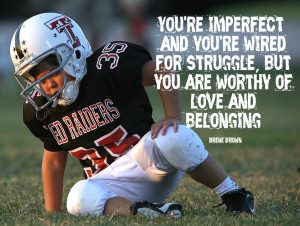
If you weren’t feeling the stress of our world right now, it would be a sign you’re dead. Part of being alive is to have struggle. Part of self compassion is to recognize that we join with our brothers and sisters, our mothers and fathers from ages past that went through other substantial struggles. We are a resilient human race that have gotten through difficult times before. All of us were meant to struggle. Humans get stronger by being challenged. It’s not easy–absolutely not. But hard doesn’t mean impossible. It means hard.
Avoid judgment on yourself for finding this time of COVID-19 isolation and social distancing hard—it IS hard. This already will make a big difference. Take care of yourself as you would take care of a scared child. You wouldn’t tell that child that its silly, or to shut up cuz no one cares, or to just keep it to herslf. Loving yourself through this difficult time rather like you would take care of a neighbour who is alarmed.
2 Limit news intake
Be kind to your nervous system. Every time you listen to the constant barrage of COVID-19 virus news it alarms your system. Turn the news off most of the time.
While it’s important to be aware of what you can do, what the situation is, it’s not necessary to have it on in the background constantly.
Perhaps listen to it once in the morning and once at suppertime.
Get a family member to change your social media passwords if you find yourself getting swallowed up in the alarm on your Twitter or Instagram feeds. They can let you in for discrete periods.
You don’t walk into a dark alley at night because you don’t want to get beat up unnecessarily. Protect your brain in the same way by limiting news.
3. Breathe
Yes. Seriously. Let’s get right down to breathing. It makes an enormous difference.
Your body needs to tell your brain you are ok…slow breathing does that. Slow and deep, in through your nose, out through pursed lips. Try box breathing: in to a count of four, hold for a count of four, out for four, hold for four:
Instead of counting to four, use four lines of four syllables each that are a particular comfort to you. For example:
Breathe in good air
I am breath-ing
Breathe out stale air
Refresh my-self
4 Practice gratitude
No, this is not flakey.
There is hard science behind this. When your brain is “what if-ing” like crazy, redirect it towards all the things to be grateful for.
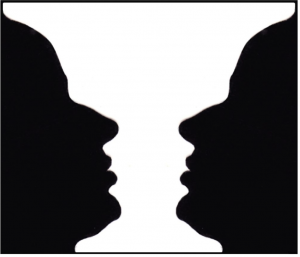
Remember that picture that is an optical illusion? When you look at it one way, it’s a black goblet. When you invite yourself to reverse the view, you see a picture of two silhouettes?
It is both a goblet and a silhouette–at the same time. Once you know they are both there, you can switch back and forth–silhouettes to goblets and back again.
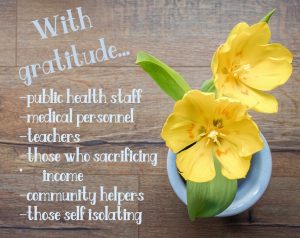
Gratitude helps us “switch” to be reminded of all the things that are going well, even in the midst of the COVID-19 crisis. The media, and the discussion amongst concerned friends and family will naturally go to all the worry and all the things wrong. Gratitude will provide you with a posture gratefulness at all the things that are going “right” in a world that seems so topsy-turvy. Let me get you started on a few things to be grateful for:
- public health officials that are plugged into hard science so they can tell us what we need to do to reduce the spread
- modern medicine that has ventilators, masks and all sorts of tools to help those that get COVID-19 (can you imagine if this were happening a hundred years ago?)
- health care workers who are brave and faithful to their calling
- neighbors helping those in quarantine so they stay home to make us all safer
- grocery story staff who are helping us buy groceries, teachers who are preparing lessons to be viewed online
- the internet–we are still connected to people we care about far away.
- you will have a host of other things you can be grateful for…list them now.

This practice of gratitude is best that: a practice. It needs to be a discipline. Something you do regularly. Periodic intermittent thinking about it won’t be the same–that’s what the research says.
Some ideas for a discipline of gratitude:
- A prayer of thanksgiving before meals–and hey, you eat multiple times a day, right?
- Develop a photo project–take one photo a day of something you’re grateful for. Create a “gratitude album” on your phone. Trade pictures every day of a gratitude moment with someone who joins with you on this project
- Write a daily email or post a quick thank you note to someone in your life that you are grateful for. Trust me, you’ll light someone else’s life up with this one!
- Create a recipe card box with 365 cards or a gratitude journal with 365 pages and write today’s date on the top. Write a few things you are grateful for today. If you keep it up for a year, next year when you add what you are grateful for, you will have this delightful recollection of what you wrote today!
- Keep a word document on your computer or start a note that you can add to daily on your phone.
5 Be with calmness
Often, when people get anxious, they find themselves drawn to other anxious people because together they start speculating, predicting doom, and generally find themselves spiralling into joint anxiety together.
Anxious people often create anxiety in other people and when they see the other person ramping up, anxiety is further increased.
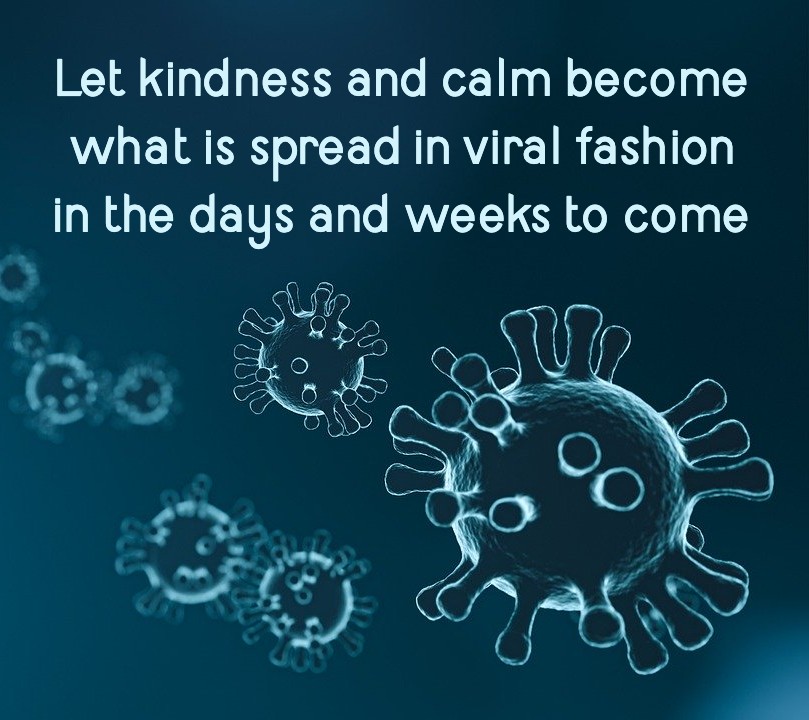
If you are an anxious sort, do yourself a favor, and find someone who is calm.
Remember when you as a parent have calmed your upset child? (Or maybe you’ve watched a someone you know calm a child that is upset) Remember how the parent picks the child up and at first sees the child’s intensity and almost meets it, with fairly quick rocking and louder reassuring words to ensure they push through the upset? And as the child feels the reassurance, the parent rocks slower, slows the pace of their words, lowers the volume and welcomes the child into a calmer space?
Yes, we all need a grown up in our lives to do that for us sometimes. Especially now, in light of COVID-19 fears and anxieties.
Some of you might turn to your spouse in the house, or a friend via video to do this for you. Others might find it through a relaxation video online, or a podcast. (I like to listen to Father Gregory Boyle as he reads Barking to the Choir on Audible when I find myself stressed).
On occasion, by request, I have recorded several minutes of a therapy session at a client’s request for them to have in their phones. That recording is something they can play back, and therapy is a place they feel safe. Who in your life helps you feel safe and calm? Have them record something for you?
For many of us, we have a sound track that feels calming and soothing. Create a play list of songs that slow your heart rate, and create a warm feeling for you. This one has been doing it for me this week.
Find a voice of calm authority in your life that can pull you back from the edge.
6 Be kind to your brain by being kind to others
Yes, you read that correctly.
Be kind to your brain by being kind to others. Seriously.
Kindness helps to build “tend and befriend chemicals” (oxytocin) that will help douse the “flight, fright, freeze” (adrenaline, noradrenaline) chemicals.
Even if you are restricted to home, you can write letters and mail them, make cookies to leave on doorsteps, call people who might need some care.
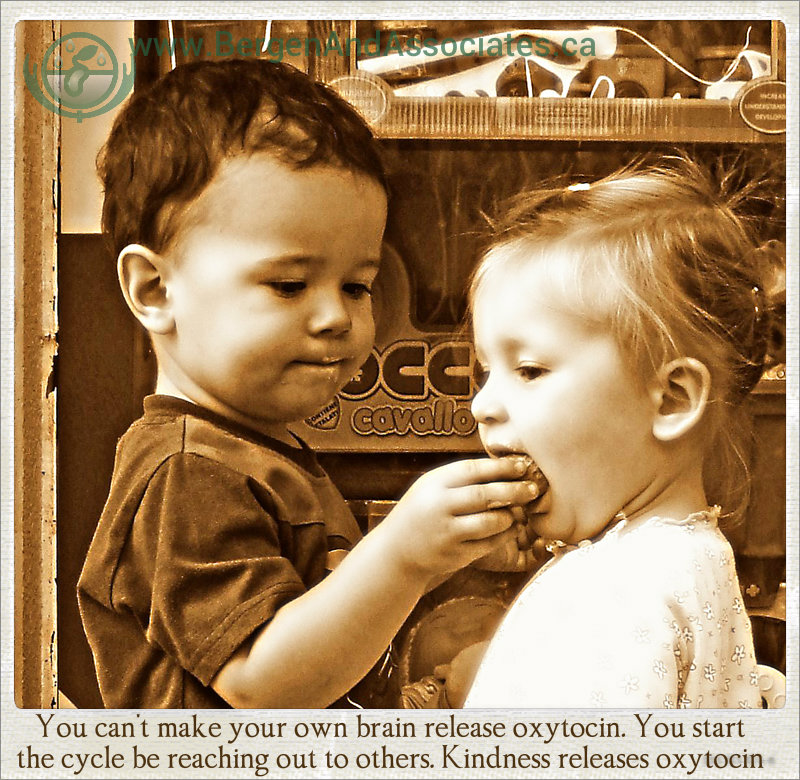
Taking care of others will reduce your level of distress…compassion benefits the one providing the compassion as much as the one receiving it.
When you are kind, you give your own brain a boost of joy–and who doesn’t need joy these days?
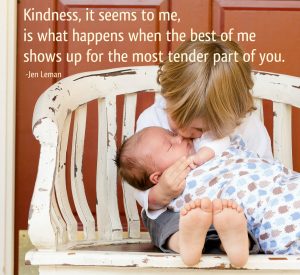
Now, more than ever, we need to be kind to our brains. Kindness to others is just the ticket!
And it just might makes someone else’s day?
Now, more than ever, others are needing our kindness! COVID-19 has created major struggles of many kinds for most of the population. There is no shortage of folks that could use your kindness!
7 Good Distraction
In the stress of it all, we need to come up for air and think about something different than COVID-19. We need to give our nervous systems a break from being on edge and do something completely different.
There is a difference between self-compassion and self indulgence.

There is a difference between distraction and numbing. And numbing costs us. When we numb fear and anxiety, we also numb love, joy, creativity and connection.
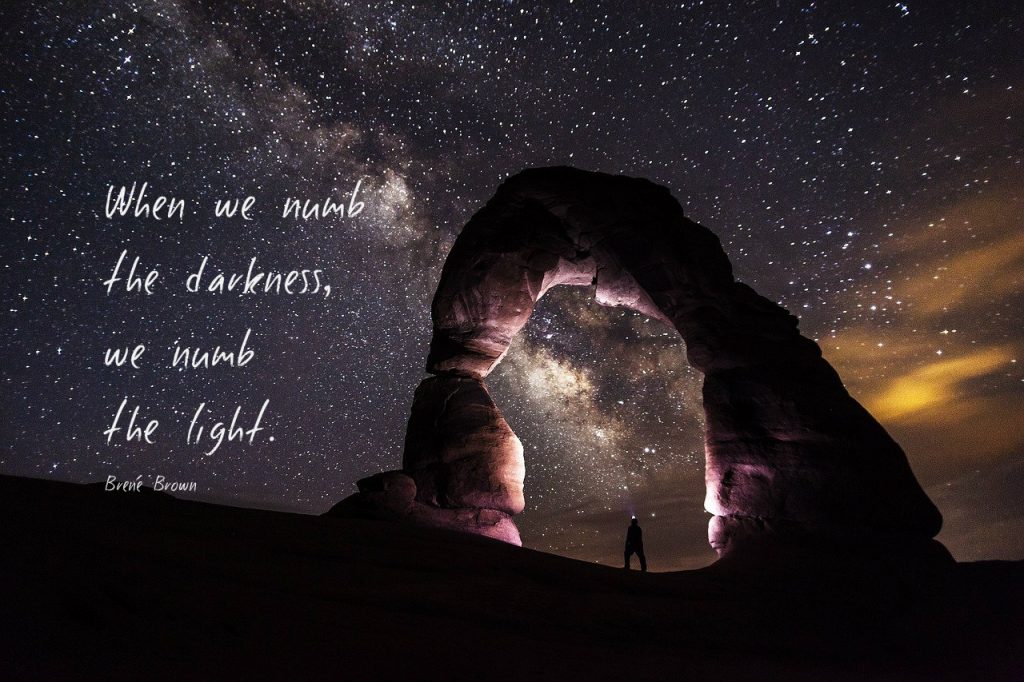
Good distractions are:

- an episode of your favorite show
- a little treat of your snack in an appropriate sized bowl
- a single drink of wine as you get together for a teleconference visit with friends
- cleaning out a closet or a drawer to get that buzz of satisfaction
- having a workout by following a video or a circuit that you make up
- putting on a humorous video for several minutes
Destructive distractions are:
- binge watching multiple episodes without a break
- eating the whole bag of snacks (and now, you feel yucky after)
- multiple alcoholic beverages in a sitting (when did that ultimately do anybody any good?)
- frenetic and endless exercising
- obsessively scouring your home
Make a good meal, play a game, learn something new, get to that work project that never made it to the top of the list before–all good distractions.
9 Establish routines
All of us–kids most obviously, but grownups too–flourish with routine.
We all do better when we have a rhythm to the day and to the week. For most of us, our familiar routines have been completely disrupted.
In this topsy-turvy world where social distancing has taken over our lives, we will steady ourselves with routine. Routines that mark the day and also the week. The hours and days will run endlessly into each other if there isn’t a rhythm to mark time.
We were meant to have purpose.
I invite you to put in tasks that are challenging to yourself because we thrive on growth. This may be the season to get to something you always hoped to learn: watercolor, French, or become adept at making pasta from scratch. Include tasks of labor. We feel good when we accomplish something. Find ways to help others (see #6 above)
Some examples of daily routines:
- Set the alarm at a reasonable time to start the day. Get out of bed with purpose
- Make your bed. Yep, that will make a difference.
- Develop a daily schedule as a household–on your own, or with your family. Have the Monday-Friday schedule be different than the weekend. Include exercise, chores, meal preparation, regular mealtimes, and of course, leisure times
- Make deliberate choices about screen time. We all love a day of staying in our pajamas and watching videos in bed–and then we all feel gross and disgusting at the end of that day.
- Include times and routines of connecting with those who will be isolated–make regular calls to elderly and those in quarantine
Examples of weekly routines:
- Dress for dinner one day a week. Jimmy Kimmel is onto something with #FormalFriday, I think.
- Order in from a restaurant on certain day(s) for a treat
- Find out when the grocery stores are least busy for a weekly shop
- Gather with your friends for a weekly show to watch on facetime together, or exercise at a certain time to a video
- Reconnect with a faith community with services on line.
9 Ground yourself
This is last, but certainly not least.
It can include breathing, but also so much more.
Find ways to hold onto the real, to regulate your heart rate. Find and use strategies that calm you. Use a calming application on your phone–they can be tremendously helpful.
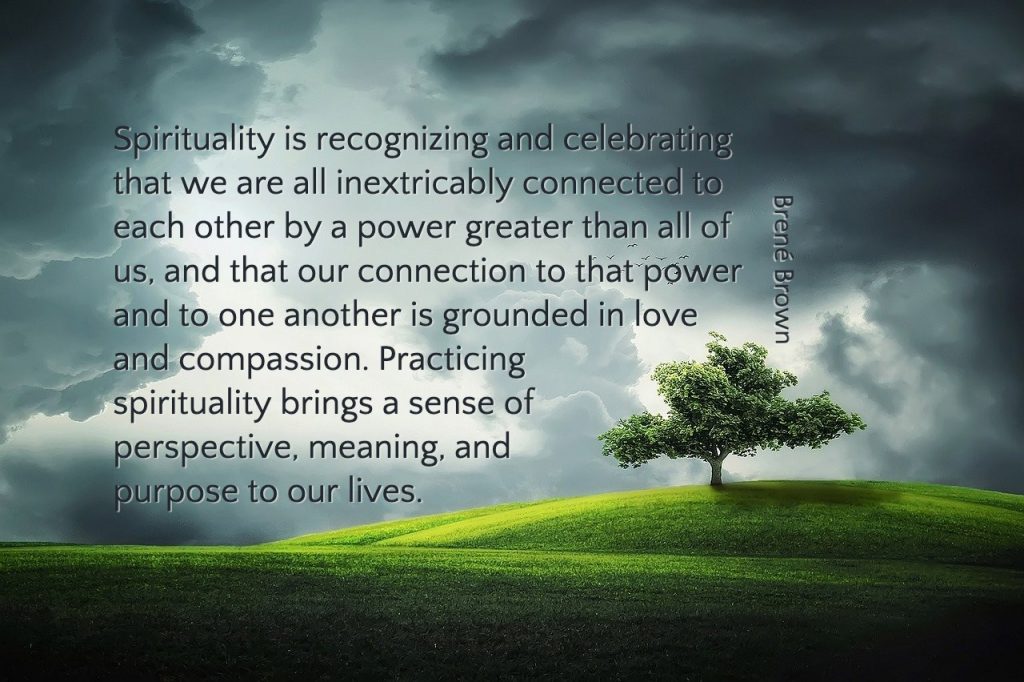
As we watch the numbers of those that test positive for COVID-19 rise, and challenges to medical staff and we realize that this is changing our life in fundamental ways, we become aware of our own mortality and begin asking big questions about meaning and purpose.
This is normal, and these are important questions for us all to deal with. And humans have been dealing with these questions since the beginning of time. I think lately, we have been so frantic and busy, we’ve created ways to avoid these important questions, perhaps to our detriment.
These aren’t easy things to contemplate, and holding space for our own vulnerability, fears, and looking at suffering and uncertainty certainly is painful. But ultimately, it is worthwhile.
So…read some good books. Listen to deep thinkers on podcasts. Look at ways others experience hope in the midst of darkness. Read stories of men and women who have triumphed in adversity to learn what they did or said or thought or dreamed to prevail.
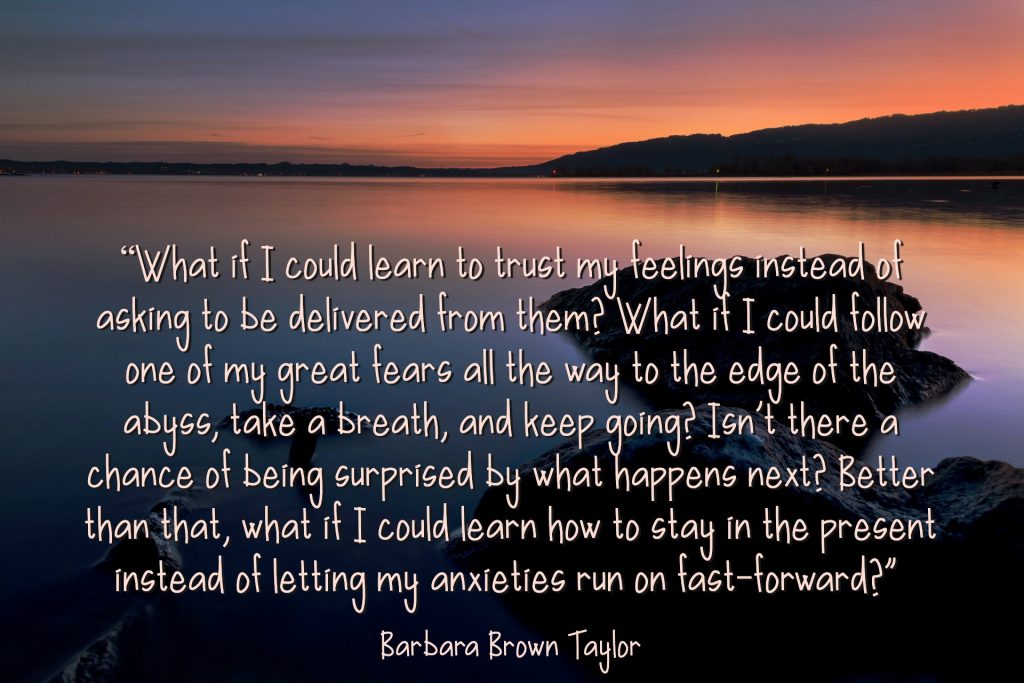
There you have it–my COVID-19 Coping Kit strategies.
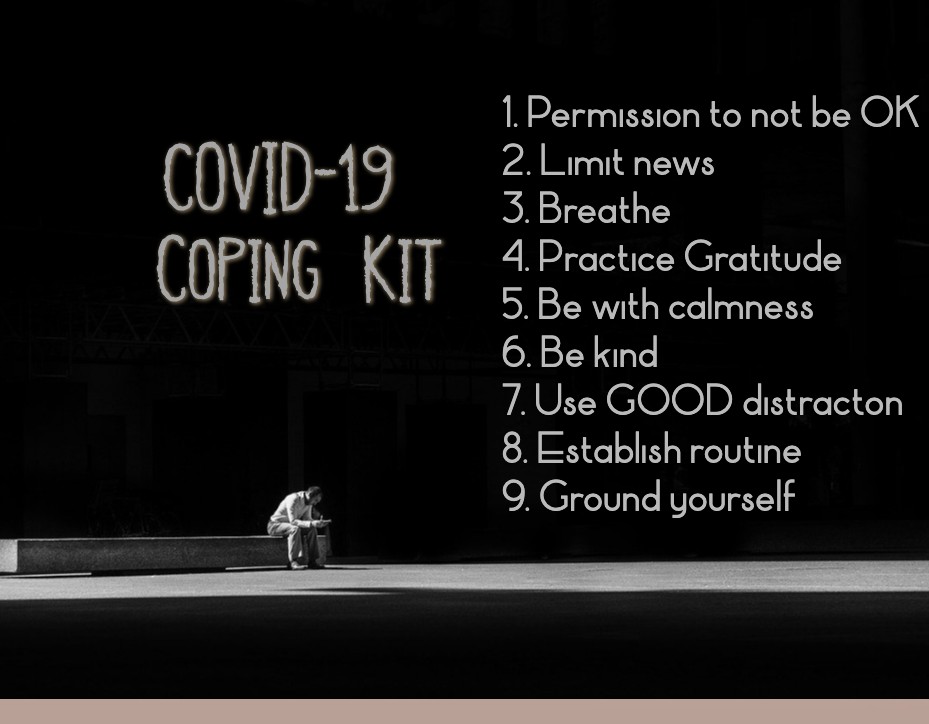
It’s likely not complete! You might have some great ideas that I’ve not got on here. I’d love to do a follow up article that includes what you’ve learned makes a difference!
Some of you will have other COVID-19 coping kit tips. I’d love for you to share them, either with a comment below or on our Conexus Counselling’s facebook page.
Let’s support each other by helping each other during these days.






Write a Comment